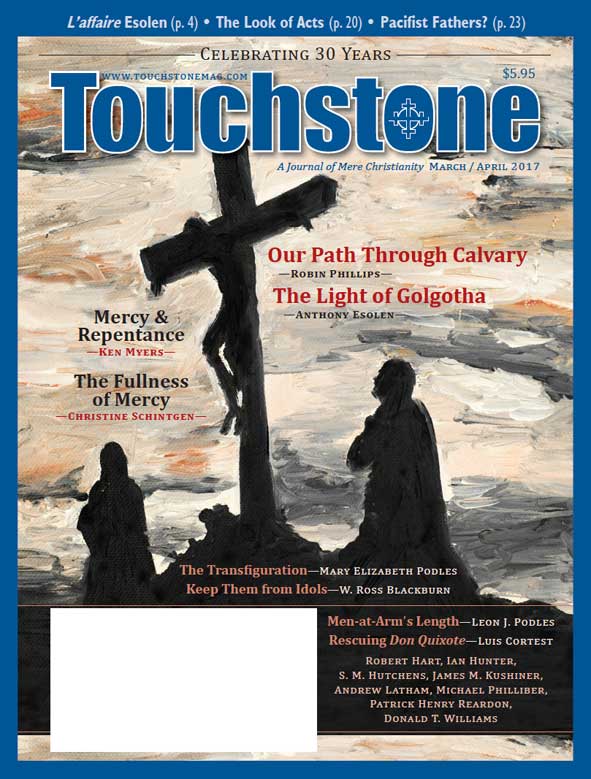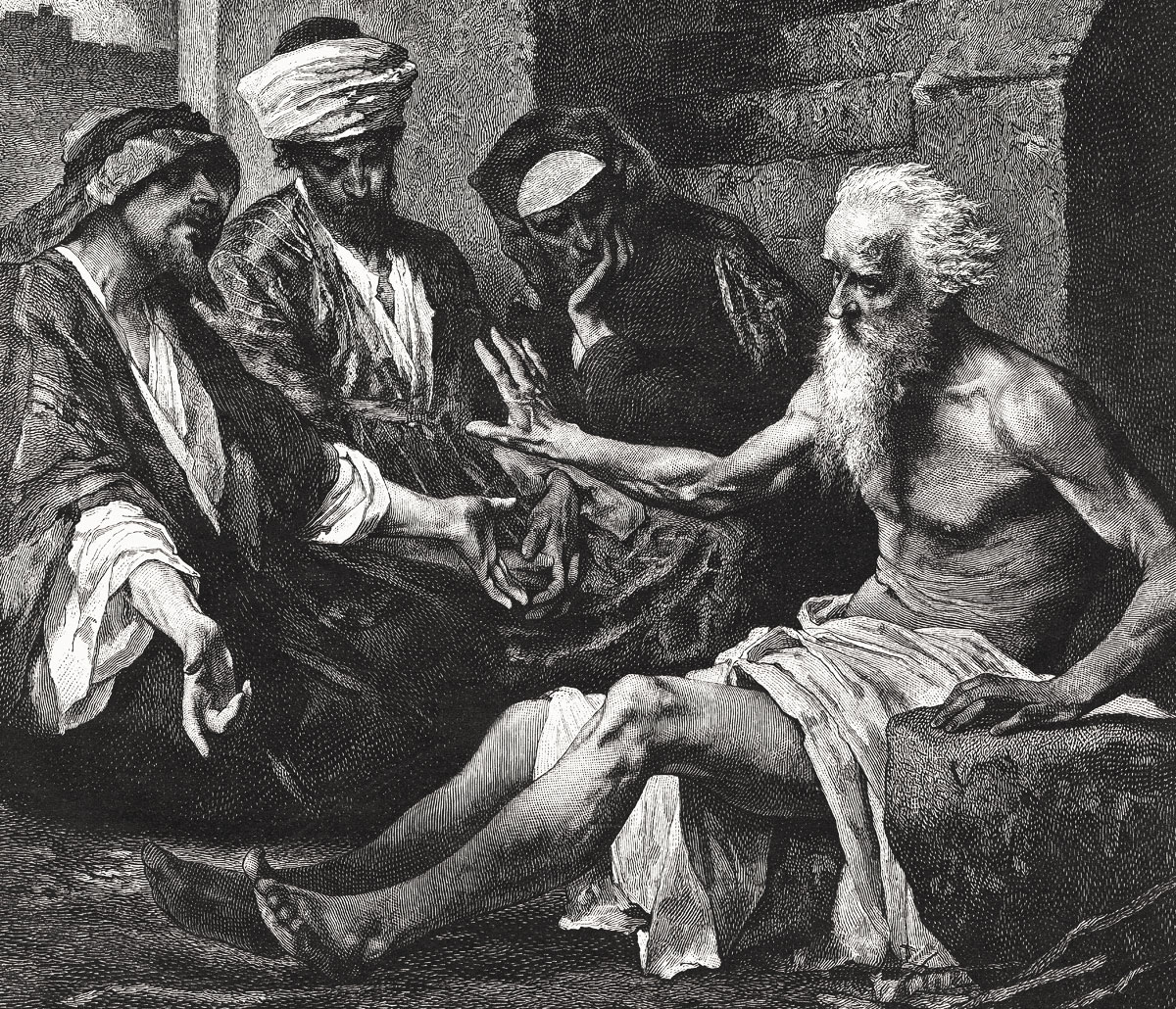Conference Talk
Men-at-Arm's Length
Soldiers of Christ & the Mixed Messages They Receive
by Leon J. Podles
The lack of men in the Western churches has been postulated or documented since the Middle Ages. Scholars, almost all male, tend to accept this as self-evident: of course men are irreligious; women are religious. But the Western Christian condition is anomalous. Eastern Christianity seems to be somewhat different in this regard, and Orthodox Judaism and Islam are completely different. Only Reformed and Conservative Judaism, which deliberately imitated Protestant patterns, have largely female congregations.
Roots of the Problem
One root of the Western problem is a mistake in philosophy, based in turn on an error in physiology: Aristotle taught falsely that the male was the only active agent in reproduction and that the female was purely passive and receptive, and that the pattern denoted by this was reflected in their respective personalities. Medieval theologians idealized the passive, receptive, obedient female as most apt for Christianity, and both liberal and conservative theologians of the modern era, from Schleiermacher to Barth to Hans Urs von Balthasar, have concurred in telling men they must become like women in order to be Christian. The idea that men must become spiritual "brides of Christ," in accordance with the theology of bridal mysticism, has permeated both Catholicism and Protestantism, and is reflected in Christian music from Bach to Jesus-is-my-boyfriend pop songs.
But in fact, the role of the male in reproduction is transitory and, after conception, peripheral to that of the female. Moreover, male identity is uncertain, and one of the strongest impulses in males is to die to their female-dependent boyhood and be reborn into manhood by establishing themselves in their own eyes and in the eyes of other men as masculine, as truly men. They don't want to become "brides of Christ." Therefore, men keep Christianity at a distance, perhaps admitting its usefulness for women and children, but feeling it as an obstacle to attaining masculinity.
Another root of the male dislike of Christianity lies within the civilizing mission of the clergy in post-medieval European society. Medieval society was violent: the homicide rate in Europe has declined 90 percent since the Middles Ages. Gang rape was also common: in some medieval French cities, half the men participated in it as a rite of passage. Such crime has also declined enormously. For one thing, the state began punishing criminals, and the clergy also tried to control the rampant sexual and violent impulses of young males.
But in their efforts to do so, clergy in the Reformation era and beyond, both Protestant and Catholic, began to oppose anything that might excite young men: not only fighting but also sports, hunting, fireworks, fiestas, and, above all, dancing, which was almost universally condemned. As a result, young men came to regard the Christian clergy as wet blankets.
Effects of Male Alienation
My publisher titled my first book The Church Impotent: The Feminization of Christianity. I didn't especially like that title at the time, but it turned out to be more appropriate than I realized. Both a Swiss and an American Catholic study conducted in the 1990s came to the same conclusion: that the presence of a practicing father was necessary to pass on the faith to the children, boys and girls alike. A believing father is not a guarantee that the children will keep their faith, but without him they will almost certainly grow up to be non-practicing.
Male alienation from Christianity has been an engine of secularization for centuries. Religion was relegated to the private, domestic, feminine sphere, a sphere that even women are now abandoning. In recent decades, women have begun to follow men out of the church. As they enter traditionally male areas of society, they also tend to adopt male attitudes, and one of those attitudes is that religion is not important.
Efforts to Reach Men
Of course, not all men discarded religion; over the centuries, many men remained connected to the churches. Various movements had the effect of convincing some men that Christianity was indeed masculine. The agon, or struggle, of the martyrs, for instance, was carried on by the Desert Fathers and other ascetics, and by monastics; monasticism itself was largely a male movement. Paul's remark about there being neither male nor female is usually misunderstood: we are all now spiritually masculine, like St. Perpetua, who was mystically anointed by an angel and changed into a man on the eve of her martyrdom.
Knighthood and military orders were obviously masculine. Confraternities provided channels for male penance and sociability, and they remain important in Hispanic cultures. The Protestant Reformers emphasized spiritual struggle, and the Jesuits of the Counter-Reformation emphasized it, too, as well as perilous missionary undertakings. Revivalism reached mostly women, but it reached more men than everyday church life did. Its theme of death and rebirth appealed to the male desire for initiation into the mysteries of life and death, which men otherwise found in Freemasonry.
In the nineteenth century, churchmen became aware that many men regarded Christianity as fit only for women, and they sought ways to reach these men. Charles Kingsley, author of The Water Babies and foe of Cardinal Newman, coined the phrase muscular Christianity. This was a union of "physical strength, religious certainty, and the ability to shape and control the world around one." Kingsley preached "godliness and manliness," but not "saintliness," which he said was "not God's ideal of a man, [but] an effeminate shaveling's ideal." In a famous exchange with Newman, Kingsley insulted Newman's celibacy as effeminate, and Newman claimed that Kingsley's approach led logically to Islam.
Kingsley expounded the need for men to express their thumos, or male energy. The male self was not to be denied, but affirmed, because it was a creation of God. Virtue was not limited to feminine behavior. As a creation of God, Kingsley maintained, masculine energy should not be repressed: "when a man acts from impulse . . . his flesh is at harmony with, and obeys, his spirit." He said that by exercise he cultivated his own
thumos, (translate as you will—wrath, spirit, pluck, or otherwise), which Plato says is at the root of all virtues. I have indulged for a while that savage element which ought to be in the heart of every man; for it alone gives him the energy by which he civilizes himself.
Kingsley's observation that thumos is central to male identity is based on Plato and was taken up by Greek theologians.
The Social Gospel & Soft Patriarchs
Shaping the world rather than retreating into the monastery and sanctuary was the aim of muscular Christianity, which was put at the service of the Social Gospel. At the beginning of the twentieth century, Walter Rauschenbusch claimed that the failure to preach the Social Gospel was the reason "that our churches are overwhelmingly feminine." Women are domestic and religious; men are public and therefore irreligious, he argued: "Men's life faces the outward world, and his instincts and interests lie that way. Hence, men crowd where public questions get downright discussion. Our individualistic religion has helped to feminize our churches." Men would find their rightful Christian place in the public, political world, and when faced with a problem or situation, they would ask the question that the Social Gospel asked: What Would Jesus Do?
The Social Gospel helped produce an unusual revival, the Men and Religion Forward Movement of 1911–1912. Rauschenbusch, the most prominent proponent of the Social Gospel, approvingly stated that "the Men and Religion Forward Movement has marked a definite advance of the social gospel in the Christian Church in America." Gail Bederman, in her study of the movement (published in American Quarterly in September 1989), notes that "the messages were often traditional, but the method of presentation was highly unorthodox. As often as possible, organizers bought ads on the sport pages, where Men and Religion messages competed for consumers' attention with ads for automobiles, burlesque houses, and whiskey."
Like modern revivalism, the Men and Religion Forward Movement used business techniques. Unlike revivalism, however, it tried to bring men into a mainline Protestantism that did not emphasize emotional peaks, but a slow, steady acceptance of responsibility in the church and in society. Men were called to reform society, to protect their families, and to be affectionate to their wives and children. It worked for a while. The Episcopal Church was the most affected; over one stretch, half of its new members were men, and this helps explain the relative health of that church in the 1950s.
Sports had for a long time been regarded as dangerous by the clergy, but to reach young men, muscular Christianity was literalized in sports, particularly in such organizations as the YMCA and the Fellowship of Christian Athletes. Promise Keepers also combined an emphasis on sports with a call for male spiritual responsibility and familial affection. These movements all aimed to produce what Brad Wilcox has called "soft patriarchs."
Successes Among Hispanic Men
Latin American Evangelicals, or Evangelicos, had success in two areas: First, they were able to reach many fathers, who were persuaded to give up destructive machismo and to become heads of families, devoting their time and money to their wives and children. Second, they were able to reach many gang members. Typically, a gang would kill a member who tried to leave the gang, unless he became an Evangelical Christian and demonstrated by his behavior that he had indeed been born again.
While Catholic and mainline Hispanic churches tended to emphasize broad social reforms, Evangelicals emphasized personal conversion and transformation, which produced immediate benefits for their families. The first thing a new Evangelical father does is buy a dining room table; whereas Catholic family members often eat alone, Evangelicals usually eat together, with the father presiding.
Among Hispanic Catholics, the movement that has had the most success in reaching men is Cursillo, a "little course in Christianity," that began in Spain in the 1920s. The course aims at educing an intense spiritual experience that produces a personal transformation. According to Kristy Nabhan-Warren, author of The Cursillo Movement in America (UNC Press, 2013, p. 154),the founder of Cursillo, Eduardo Bonnín Aguiló, wanted "to create manly, strong, but also emotionally connected soft patriarchal Christian soldiers for Christ—men who would be better husbands, fathers, and Christians." Opus Dei, another Catholic movement founded in Spain in the early twentieth century, also places an emphasis on work and family life and has reached some Hispanic men.
Thumos & Prautes
The movements cited above can provide models for work with men, but an enduring problem in the Church is that it does not have an accurate anthropology of masculinity, partly because of the heritage of mistaken Aristotelianism. Masculinity is not activity, and femininity is not passivity, however these are qualified.
Plato attentively observed young men, and seeing how they were always a potentially destructive force in society, decided that they were motivated by thumos, that is, spiritedness, a male energy that often takes the form of anger. He saw that thumos gave a man the drive to seek fame and honor (time in Greek), or, as we would say it now, to establish his identity as a man. This is crucial, for psychologists and anthropologists concur that the male's identity is less certain than the female's; thus, a male needs to substantiate himself as a man by establishing a reputation, that is, by receiving time, honor. Men often pursue this goal in stupid, harmful, and misguided ways, but whether pursued destructively or constructively, wildly or rationally, it is a fundamental drive in men.
The emotion of Jesus most mentioned in Scripture is that of anger, a characteristic expression of thumos. Yet he is meek and gentle of heart. Thumos as anger is moderated in Christ by prautes, meekness. In the Nichomachean Ethics, Aristotledefines prautes as the mean between being too angry and not being angry enough. The meek (praus) man "feels anger according to the dictates of reason, on proper occasions, and for a proper length of
time."
True Masculine Honor
According to the Catholic theologian Paul Gondreau, "more than any other passion, anger readily assists in and accords with Jesus' mission of salvation, which consists in reestablishing the order of divine justice that human sin has perverted." Vengeance, according to Thomas Aquinas, is itself a good: "It is praiseworthy to desire vengeance as a corrective of vice and to preserve the good of justice." The wrath of the Lamb is revealed in the Book of Revelation, as Jesus, the divine hero, destroys his enemies; and the last enemy to be destroyed is death. Thus, through the exercise of righteous anger, perfect justice is attained and the kingdom of God established.
During his days on earth, Jesus accomplished his mission by accepting his expendability. The men of the classical world knew—and, indeed, all men at some level know—that when it comes time to die, a man goes first. A man received the highest honor when he faced the greatest danger, striving against impossible odds, to save his people. In saving them, he became their father, for the father was a savior. Jesus sought this honor, knowing that the only true honor was bestowed by his Father.
We frequently gloss over all the mentions of honor and glory in the New Testament, but that is what motivates men in their quest to establish an identity—whether it is Boy Scouts striving to earn merit badges or financial traders striving to earn multi-million-dollar bonuses. But the only true honor comes from the infallible Judge of the living and the dead.
Jesus is the God Hero who has trampled down death by death, and who therefore has the name above every other name. By joining their own efforts to his self-sacrifice, men can also receive honor from the Father. Men more or less willingly take on all the dangerous work of society, and they more or less willingly go to fight and die when their country calls them, because they want to be men. I think they will also respond if they hear the call to be disciples—not brides—of the One who gave his life for the salvation of all. In the words of Reginald Heber's hymn:
The Son of God goes forth to war
A kingly crown to gain.
His blood-red banner streams afar;
Who follows in His train?
Who best can drink His cup of woe,
Triumphant over pain,
Who patient bears his cross below—
He follows in His train.
Leon J. Podles holds a Ph.D. in English from the University of Virginia, has worked as a teacher and a federal investigator, and is president of the Crossland Foundation. He is the author of The Church Impotent (Spence), Sacrilege (Crossland Press), and Losing the Good Portion: Why Men Are Alienated from Christianity (St. Augustine Press). Dr. Podles and his wife have six children and live in Baltimore, Maryland. He is a senior editor of Touchstone.
subscription options
Order
Print/Online Subscription

Get six issues (one year) of Touchstone PLUS full online access including pdf downloads for only $39.95. That's only $3.34 per month!
Order
Online Only
Subscription

Get a one-year full-access subscription to the Touchstone online archives for only $19.95. That's only $1.66 per month!
bulk subscriptions
Order Touchstone subscriptions in bulk and save $10 per sub! Each subscription includes 6 issues of Touchstone plus full online access to touchstonemag.com—including archives, videos, and pdf downloads of recent issues for only $29.95 each! Great for churches or study groups.
Transactions will be processed on a secure server.
more on 2016 Conference from the online archives
more from the online archives
calling all readers
Please Donate
"There are magazines worth reading but few worth saving . . . Touchstone is just such a magazine."
—Alice von Hildebrand
"Here we do not concede one square millimeter of territory to falsehood, folly, contemporary sentimentality, or fashion. We speak the truth, and let God be our judge. . . . Touchstone is the one committedly Christian conservative journal."
—Anthony Esolen, Touchstone senior editor










